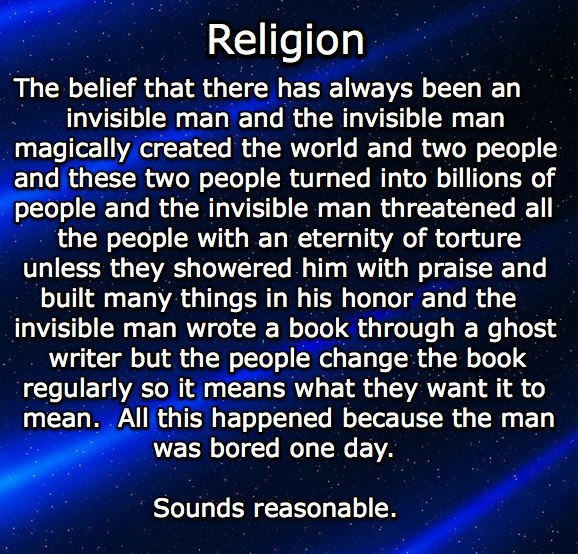Another interesting article from Eurozine. Sven-Eric Liedman argues, in "The rebirth of religion and enchanting materialism," that religion is retaking the world in ways that make many uncomfortable. He also argues that the current crop of atheists are not helping the matter by offering a bleak and gray worldview that cannot compete with the bold color worldviews of Islam, Pentecostalism, and other ascendant faiths.
Please note that this article is a translation from the original Swedish, which might explain some of the clunky phrasing.
The rebirth of religion and enchanting materialism
A while ago, I was talking to a friend about religion. We agreed that we both were atheists. But he added: "I am a Jewish atheist". I myself would have to specify my own position in a corresponding manner: I am a Lutheran atheist.
Such is the immediate limitation of atheism. The word "atheism" is in itself a negation: not God. Moreover, the atheist has freed him or herself from a fixed belief; normally the one that is dominant in the culture that has permeated his or her childhood and youth. Atheism is at first like the negative of the photo which, according to the believer, depicts the world.
Naturally, the non-believer is also a non-believer in relation to other faiths. I do not believe more in Allah or Vishnu than I do the Christian God. Still, I have never been posed with the alternative of seeking my faith in the Koran or the Vedic scriptures.
It is atheism's constant challenge to appear singularly as a negation. It states what it does not believe but not what it positively represents. This is what makes atheism seem grey and dull. Where religion paints our existence in bold colours, where it seeks its significance in wonderful tales, and where the difference between right and wrong is anchored outside of the world of humans, the atheist claims that the truth of the world is rather trivial and considers the holy scriptures as fine literature amongst other fine literature and morals an altogether human affair.
Finally, I will try to outline an atheism that does not appear bleak and does not have an antagonistic atheism's lack of tolerance and blindness to the religions' aesthetic and cultural values. In recent years, some spirited atheist confessions have come to light, chiefly the
English biologist Richard Dawkins' The God Delusion[1] and the French philosopher Michel Onfray's Traité d'athéologie[2]. I will, in concluding, consider my position on them. The immediate reason for Dawkins's and Onfray's books is the rebirth of the religion, which has been so apparent throughout virtually the entire world these past decades. Politics is today permeated by religious sentiments and beliefs in a way that my generation at least has not seen the likes of. US president George W. Bush is a Born Again Christian and does not pass up a chance to justify his political decisions with reference to God. Islam has become a political power on the world stage. Even for the Chinese state, religion is becoming a growing problem, impossible to fit into to the official ideological alloy of capitalism and communism.
Religion's increasingly obvious presence in politics corresponds to a great popular commitment to different religious movements. Principally two religions are conquering new souls: Islam and Christianity. Different branches of Islam are winning ground in several places around the world; here, the emphasis is mainly on the Sunni branch of Salafism. However, riding the greatest wave of success is the branch of Christianity called Pentecostalism. It is gaining strength not only in the United States, but yet more in Latin America and Africa. If the current pentecostal wave of success were to continue, three quarters of mankind would be included in some form of Christianity by the year of 2050.[3] And it is expressly Penecostalism that constitutes the dynamic power in this development, while the Catholic church for example, ostensibly so firm, is losing ground.
The past decades' successful movements within Christianity and Islam have many common denominators. The principal among them is an unflinching conviction of what indispensable essence their own religion has, but also a certain anti-intellectualism, manifested in a shared aversion to Christian or Islamic theology (kalam) and to academic endeavour in general. Moreover, both are highly dependent upon new media such as TV and Internet for their own dissemination. Both also correspond to a tendency within modern secularization: religion is freeing itself more and more from the culture in which it was previously rooted and is gaining new followers who live under entirely different cultural conditions than those prevalent in the previous ambits of these faiths.
Read the rest.
Tags:


No comments:
Post a Comment